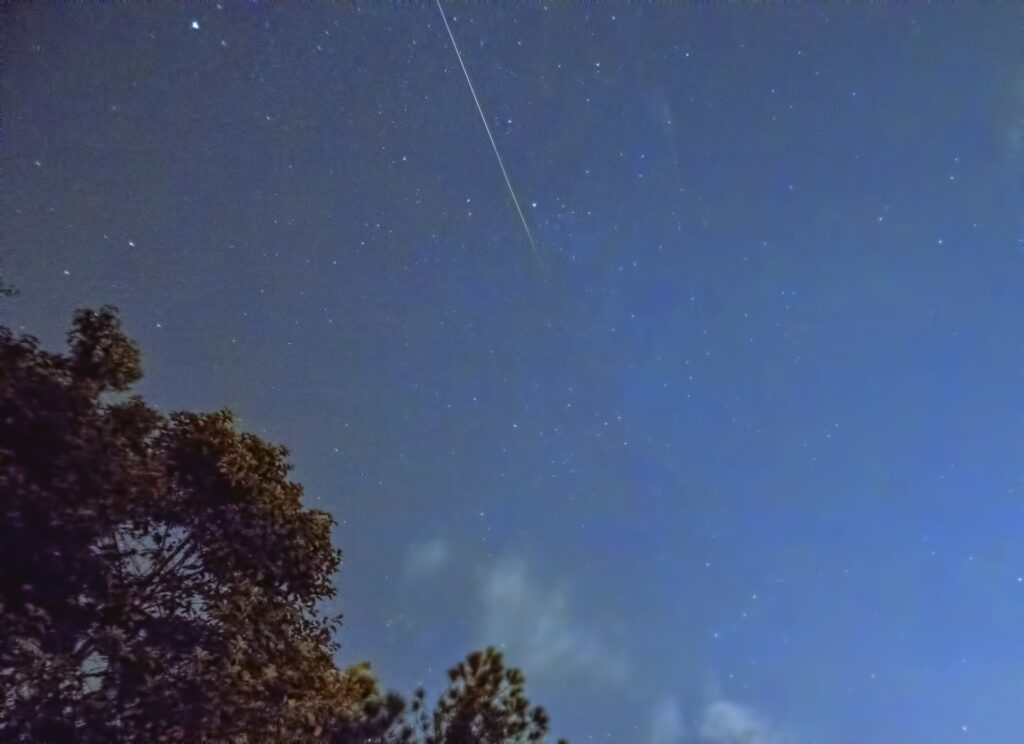How to view the 2021 Perseid meteor shower
August 11, 2021
By Amy Sayle
Have you seen a Perseid meteor yet?
The annual Perseid meteor shower started in the second half of July and will be active well into August. The predicted peak night is tonight, August 11-12, 2021 (Wednesday evening into Thursday morning). Tomorrow night, August 12-13, 2021 (Thursday evening into Friday morning), should be good, too.
Meteors are the streaks of light—sometimes misleadingly called “shooting stars”—that you see in the sky when cosmic debris slams into Earth’s atmosphere at thousands of miles an hour. The Perseids are the result of debris left over by Comet Swift-Tuttle on its periodic trips around the Sun.
Here’s how you can best view the Perseids this year:

1. Check your weather. Ideally, you’ll have perfectly clear skies. But partly cloudy skies will do.
2. Choose a location. For public health reasons, Morehead’s in-person Perseids skywatching event has very limited capacity this year; registration for it is full. But you can still watch this on your own! Ideally, choose a dark site with an open view of the sky.
3. Choose a date and time. If you’re determined to see the most meteors, plan to go out sometime in the last dark hours before dawn on Thursday morning, August 12, 2021. For central North Carolina, between about 2 and 5 a.m. would be an optimal time. Or try that same time on Friday morning, August 13, 2021. It’s the pre-dawn hours when your side of Earth is leading in space and sweeping up the most meteors.
But you can still expect to see Perseids if you go out during the more reasonable evening hours on either Wednesday, August 11, or Thursday, August 12. If you’re viewing soon after nightfall, don’t expect to see a whole bunch of meteors, though you might see a dramatic “earthgrazer”—a long, slow meteor. Expect to see more meteors as the night goes on. If you’re at a very dark site, you might see on average roughly a meteor a minute. Adjust your expectations if you live in a light-polluted area, such as the NC Triangle area, or if you’re in a rural area but your neighbors have glare bombs as outside lighting.
4. Get comfy. Use a blanket, sleeping bag, or reclining chair so you don’t have to crane your neck and so you can get the widest possible view of the sky.
5. Avoid artificial light. If you’re viewing in your own yard, turn off your house lights. Consider asking your neighbors to turn off their exterior lights. If there’s an unshielded street light nearby, position yourself so a tree or building will block it. Don’t use white flashlights or cellphones.
6. Look toward the darkest part of your sky. You don’t need fancy equipment—just your eyes. A telescope can be helpful for observing some of the other objects in the night sky, but its restricted field of view is counterproductive for meteor viewing.
7. Don’t worry about knowing how to identify Perseus. The Perseids get their name from the constellation they appear to fly away from, Perseus the Hero, which lies in the northeastern sky in August evenings. But the meteors can appear anywhere in the sky.
8. Be patient. Plan on being outdoors for more than just a few minutes. Your eyes need time to adjust to the dark, and the meteors can come in clumps.
9. Look at the sky. By the time your friend exclaims in delight at the meteor they saw, it’s probably too late for you to see it.
Even if you never see a meteor, there’s lots more to see in the current evening sky. This week, the waxing crescent moon is visible in the first part of the evening. At nightfall, Venus is low in the west; in the southeast, look for Saturn, with Jupiter to its lower left.
For our current star map, see Morehead’s skywatching page. We hope to see you at a skywatching event this fall!
